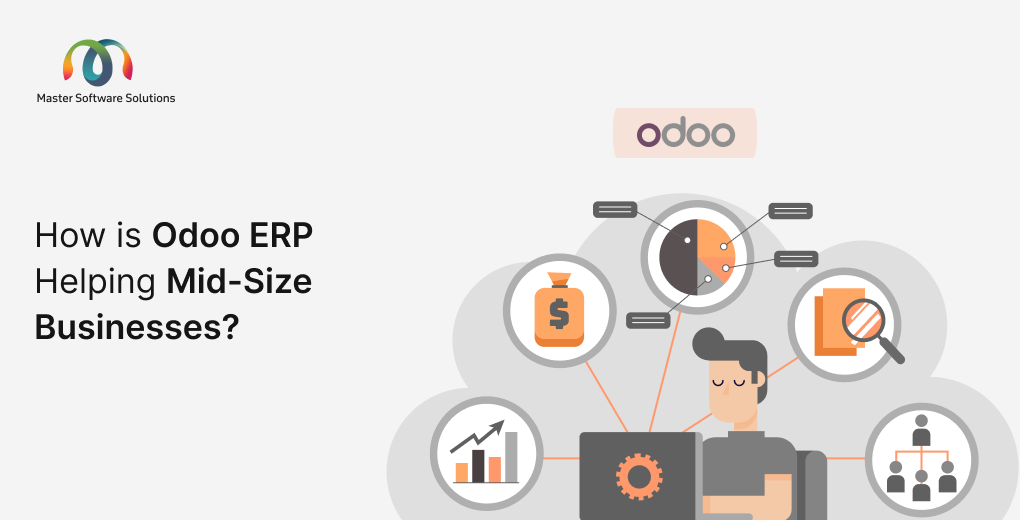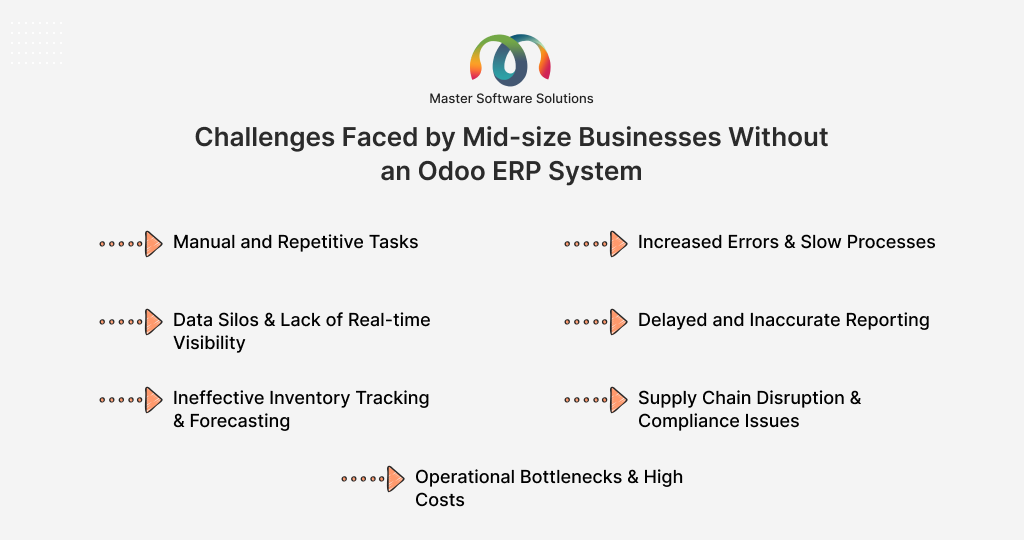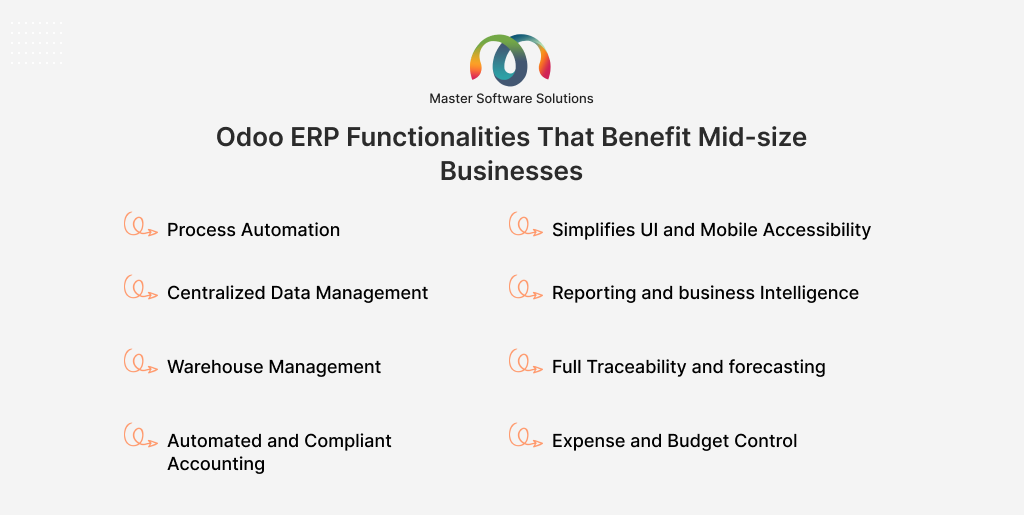If you are a medium-sized business that still operates manually or with isolated systems, now is the time to implement Odoo ERP. The main challenges? Your current system is disjointed, creating data silos that can slow down operations and make informed decision-making impossible.
This blog describes how Odoo ERP provides an integrated solution by offering a modular suite of business applications that eliminate data fragmentation, automate core workflows, and provide the required real-time visibility.
Table of Contents
What is Odoo ERP software?
Odoo ERP software is a comprehensive enterprise resource planning system that offers end-to-end solutions for small and medium-sized businesses. Its modular structure makes it suitable for a wide range of business types.
The system comprises multiple business applications, also known as modules, including Inventory, Purchase, Accounting & Finance, CRM, Point of Sales, Project, Manufacturing, Barcode, Dashboards, and many more.
The system is highly scalable. You can add and remove modules according to your business requirements. Odoo supports the pay-as-you-use payment model, which allows you to pay only for the modules you use, rather than the entire system.
Why do mid-size businesses need Odoo?
Medium-sized businesses that operate without an Odoo ERP often face challenges as they grow and scale. These challenges are mainly due to manual processes, disconnected software, and fragmented data. Here are the challenges faced by mid-size businesses without an Odoo ERP system:
Manual and repetitive tasks
Processes, including order entry, inventory updates, invoicing, and reporting, are often done manually or on spreadsheets, consuming excessive time and human resources.
Increased errors & slow processes
Manual data entry and transfers between disconnected systems can increase the risk of human errors, leading to inaccuracies in inventory counts, invoices, financial reports, and customer records. The lack of automation and unified workflows slows down critical cycles, such as the order-to-cash process and financial closing.
Data silos & lack of real-time visibility
Information is scattered across various isolated systems, spreadsheets, and departments. This makes it difficult to get a unified view of the business. Managers lack an accurate, real-time snapshot of key metrics, such as cash flow, profitability, inventory levels, or sales performance. This forces them to make reactive instead of proactive decisions.
Delayed and inaccurate reporting
Manually compiling reports or verifying data from multiple sources can delay the monthly or quarterly reports. This leads to outdated or inconsistent insights being used for strategic planning.
Ineffective inventory tracking & forecasting
Disconnected tools or manual tracking lead to inaccurate inventory data, resulting in costly issues like stockouts (missed sales) or overstocking (tied-up capital and potential obsolescence). Without a centralized system, analyzing historical sales data and forecasting customer demand is challenging and prone to errors. This can complicate purchasing and production planning.
Supply chain disruption & compliance issues
Lack of real-time visibility and communication across procurement, warehousing, and sales can lead to delays and disruptions in the supply chain. Manually tracking and ensuring compliance with tax regulations, industry standards, and data privacy laws is time-consuming, prone to errors, and increases the risk of penalties.
Operational bottlenecks & High Costs
As a business expands, non-standardized and manual workflows are ineffective. They can slow down the process and prevent expansion to new markets. Spending time and money on multiple licenses, maintenance, and integrations for various non-communicating software solutions can become more expensive than a single, integrated ERP solution.
Odoo ERP functionalities that benefit mid-size businesses
The Odoo ERP system helps organizations, especially small and medium-sized enterprises, navigate common business challenges with its modular, integrated, and flexible suite of applications. Here are the Odoo ERP functionalities that benefit mid-size businesses.
Process automation
Odoo ERP allows automation of routine, multi-departmental tasks. For instance, a confirmed sales order can automatically trigger a delivery order in inventory, create a manufacturing order, and generate a draft invoice in accounting. You can also automate replenishment. The inventory and purchase app automatically generates purchase order suggestions when stock levels hit predefined minimum thresholds (reordering rules). This is based on real-time stock, vendor lead times, and sales forecasts, preventing stockouts and overstocking.
Simplifies UI and mobile accessibility
Ooo offers a user-friendly, clean interface across all applications, reducing the learning curve and lowering employee resistance, leading to higher system adoption and faster task completion. Dedicated mobile apps enable employees to record data instantly from tablets or smartphones, ensuring real-time updates and eliminating delinquent data entry.
Centralized data management
Odoo uses a single, unified database across all applications. All customer, product, inventory, and financial data is instantly shared and consistent, eliminating data silos and reconciliation problems. The data is automatically updated on the financial ledger of the accounting app as the goods are purchased, moved, or sold. This provides an immediate and accurate view of stock value and Cost of Goods Sold (COGS).
Reporting and business intelligence
Every business app in Odoo ERP includes role-based dashboards with key performance indicators (KPIs) and graphs. This provides users with real-time, consolidated performance data, such as sales pipelines, cash flow, and stock levels. As all the data is connected, the system can generate comprehensive reports for profit & loss, balance sheets, and sales analysis. The system integrates data from various departments, enabling data-driven decisions.
Warehouse management
The Odoo inventory app supports barcode scanning for all key warehouse operations, including receiving, picking, packing, and inventory adjustments. This improves data accuracy and speed, eliminating manual input error for lot, serial, and product tracking. The Odoo system also enables multi-warehouse and location management. You can manage inventory across multiple physical warehouses and specific internal locations. It also offers features, such as putaway rules and optimized picking strategies, ensuring efficient stock placement and retrieval, minimizing movement time.
Full traceability and forecasting
Odoo enables full end-to-end traceability of products, from vendor receipt through production to customer delivery. This is vital for quality control, regulatory compliance, managing product recalls, and tracking warranties. Integrated sales and manufacturing apps in Odoo provide predictive insights into future material needs. This supports Just-In-Time (JIT) and Make-To-Order (MTO) strategies, reducing the need for large stock buffers and lowering holding costs.
Automated and compliant accounting
Odoo connects directly with the bank account to import statements automatically. The reconciliation tool uses AI to suggest matches between bank lines and invoices/bills, speeding up the process and ensuring accurate record-keeping. Odoo offers country-specific fiscal packages that pre-configure the system with the required charts of accounts, tax structures, and legal statements, helping businesses stay compliant with local regulations.
Expense and budget control
Employees can submit expenses directly through the app (photo uploads). The expense is automatically routed for managerial approval, creating the corresponding accounting entry upon validation, which centralizes expense tracking and simplifies reimbursement. The accounting app allows managers to design detailed budgets for accounts and analytics. Real-time reports compare actual performance against the defined budget, allowing proactive financial control and variance analysis.
How can Master Software Solutions help you implement the Odoo ERP system?
Master Software Solutions is an IT service-based company that offers end-to-end Odoo consulting services, including implementation, migration from legacy systems, version upgrades, module development, and customizations. We are an official Odoo-certified partner who has developed various Odoo plugins to enhance its existing functionalities. Contact us to discuss your business needs and how we can assist.


